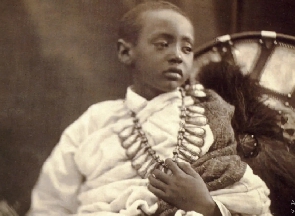 Prince Alemayehu is believed to have been stolen by British soldiers -- Photo Credit: Julia Margaret
Prince Alemayehu is believed to have been stolen by British soldiers -- Photo Credit: Julia Margaret
A lock of hair belonging to an Ethiopian prince who passed away in the UK over 140 years ago was given back to the Horn of Africa nation’s ambassador to the European country, per BBC. As previously reported by Face2Face Africa, Prince Alemayehu was taken to the UK at the age of seven after British soldiers allegedly stole him when they laid siege and looted his father Emperor Tewodros’ Maqdala imperial fortress in 1868.
The Ethiopian royal, whose father took his own life during the siege, was supposed to arrive in the UK with his mother, however, she died during the journey. After arriving in the UK, Queen Victoria became fond of him and ensured he was educated. Prince Alemayehu, however, died of an illness at the age of 18 after suffering racism and was buried at St George’s Chapel at Windsor Castle upon the request of Queen Victoria.
Captain Tristram Charles Sawyer Speedy was part of the entourage that brought Prince Alemayehu to the UK. Queen Victoria also put the prince under Speedy’s care and provided the royal financial support.
Prince Alemayehu’s lock of hair being returned comes amid calls from his family to have his body exhumed and returned to his home country. But the Buckingham Palace recently denied their request.
Speedy also initially had the Ethiopian prince’s hair in his possession before the Scheherazade Foundation arranged for it to be returned. A relative of Speedy, Leonie Turner, told CBC that she found the lock of hair in their family’s heirlooms.
“I felt Prince Alemayehu’s hair was a long way from home,” Turner reportedly said.
The deceased Ethiopian royal’s lock of hair was handed back to Ethiopia’s ambassador to the UK Teferi Melesse during an event in London on Thursday. Other artifacts that were looted from his father’s fortress were also returned. Melesse also said they’ll continue asking the UK to hand over more items that were looted from the emperor’s fortress.
“The restitution of Ethiopian artifacts looted by the 1868 British expedition to Magdala is important for restorative justice and an excellent way to build better relations and collaborations between British and Ethiopian institutions,” Alula Pankhurst, who is a member of Ethiopia’s Heritages Restitution National Committee, told BBC.